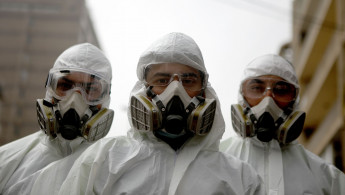Follow us on Facebook, Twitter and Instagram to stay connected
1,550 in Lebanon contract coronavirus, setting grim new daily record
Lebanon's covid-19 cases have shot up, prompting concern from authorities as the country still reels from the Beirut explosion which destroyed half of the capital city.
2 min read
Employees of a Lebanese public health company pose with their protective gear [Getty]
Lebanon’s coronavirus cases have surged to their highest yet, as the country struggles to deal with the pandemic in the wake of the Beirut explosion.
Local reports confirm that the daily case numbers have increased to 1,550, which is a new record.
Two more people have died from covid-19 in the country, bringing the total death toll up to 501.
The country’s healthcare system is suffering due in part to the economic crisis, and central banks have made it difficult to import essential medical supplies by requiring importers provide cash lira for subsidies.
Medical syndicates told press that hospitals could stop working "within days" if Banque du Liban doesn’t reverse its subsidy decision.
Countrywide closures
Almost 170 Lebanese villages and towns will go into lockdown for the next week, the government said on Sunday, as it grapples with record numbers of novel coronavirus cases.
Authorities have also ordered bars and nightclubs nationwide closed "until further notice".
An interior ministry statement said 169 villages and towns across the country would be locked down for one week from 6:00 am (0300 GMT) on Monday.
Around half of those localities had already been placed in lockdown under measures announced this month, including the closure of all public and private institutions excluding bakeries and pharmacies.
Lebanon, a Mediterranean country reeling from its worst economic crisis in decades, has recorded 52,558 novel coronavirus cases, including 455 deaths.
Infections have spiked in the aftermath of a catastrophic explosion at Beirut's port on August 4 that killed more than 200 people, injured thousands, damaged several hospitals and overwhelmed the capital's health services.
Lebanon's caretaker health minister warned on Monday that increasing virus cases in the country could reach levels seen in Europe and called localised lockdowns a "last chance".
Authorities fear the continuous rise of cases could further overwhelm the country's fragile healthcare sector.
On August 21, authorities imposed an almost nationwide lockdown as well as a night-time curfew, but they eased the restrictions a week later after protest from the private sector.
Local reports confirm that the daily case numbers have increased to 1,550, which is a new record.
Two more people have died from covid-19 in the country, bringing the total death toll up to 501.
The country’s healthcare system is suffering due in part to the economic crisis, and central banks have made it difficult to import essential medical supplies by requiring importers provide cash lira for subsidies.
Medical syndicates told press that hospitals could stop working "within days" if Banque du Liban doesn’t reverse its subsidy decision.
Countrywide closures
Almost 170 Lebanese villages and towns will go into lockdown for the next week, the government said on Sunday, as it grapples with record numbers of novel coronavirus cases.
Authorities have also ordered bars and nightclubs nationwide closed "until further notice".
|
An interior ministry statement said 169 villages and towns across the country would be locked down for one week from 6:00 am (0300 GMT) on Monday.
Around half of those localities had already been placed in lockdown under measures announced this month, including the closure of all public and private institutions excluding bakeries and pharmacies.
Lebanon, a Mediterranean country reeling from its worst economic crisis in decades, has recorded 52,558 novel coronavirus cases, including 455 deaths.
Infections have spiked in the aftermath of a catastrophic explosion at Beirut's port on August 4 that killed more than 200 people, injured thousands, damaged several hospitals and overwhelmed the capital's health services.
Lebanon's caretaker health minister warned on Monday that increasing virus cases in the country could reach levels seen in Europe and called localised lockdowns a "last chance".
Authorities fear the continuous rise of cases could further overwhelm the country's fragile healthcare sector.
On August 21, authorities imposed an almost nationwide lockdown as well as a night-time curfew, but they eased the restrictions a week later after protest from the private sector.





 Follow the Middle East's top stories in English at The New Arab on Google News
Follow the Middle East's top stories in English at The New Arab on Google News
![Netanyahu furiously denounced the ICC [Getty]](/sites/default/files/styles/image_330x185/public/2024-11/GettyImages-2169352575.jpg?h=199d8c1f&itok=-vRiruf5)
![Both Hamas and the Palestinian Authority welcomed the ICC arrest warrants [Getty]](/sites/default/files/styles/image_330x185/public/2024-11/GettyImages-2178351173.jpg?h=199d8c1f&itok=TV858iVg)
